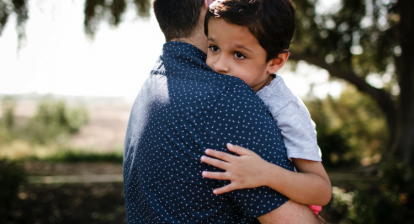Over the past few months we have experienced more loss than most people have in their lives and this is especially true for our younger population. First, we lost our work, next we lost school, then we lost the ability to see our friends and extended families, and then we lost our routines and sense of safety. We may have even lost sight of how to navigate this new COVID-19 world. Well, what most news sources and social media articles are failing to mention is that we are all experiencing complex grief associated with the pandemic.
Grief is an emotion someone feels after the loss of someone or something. Often times grief is associated with the loss of an important person in one’s life, but people can grieve the loss of something too.
Here are some of the losses and grief that you and your child might be experiencing right now and some ways to help cope with these feelings.
NON-DEATH AND SECONDARY LOSSES
Non-death loss is the loss of something in one’s life and this can cause someone to grieve. Non-death losses are all of the things that changed after the pandemic hit. The loss of routines, going to school, seeing friends and family, and so much more.
Secondary losses are the other losses that come with losing a loved one, or a major loss in one’s life. Control is one of the major secondary losses that is being experienced right now along with relationships and friendships with colleagues, classmates and teammates, and routines, celebrations and events.
A way to ease the pain is to acknowledge these losses and brainstorm ways to help bring some of these things back. Schools are now having online sessions, and people have been very creative in coming up with ways to keep connections with family and friends. For example, doing an activity with a grandparent over a video chat, such as baking or reading a book together.
ANTICIPATORY GRIEF
Anticipatory grief is the feeling that occurs before an impending loss. This may feeling like being on edge, finding yourself or your child angry at things that are out of control, or always thinking about the worst-case scenario. Anticipatory grief may also cause exhaustion, withdrawal, or avoidance.
With the unprecedented nature of COVID-19, things are forever changing month to month, week to week, day to day and even hour to hour. Once we have had a chance to wrap our heads around the changes, things seem to change again and now we are in a state of always anticipating the next big change.
Some things that you can do to help with this type of grief is to establish routines. Routines help take out the stress of wondering what the next big change is and create some stability in the “new normal.”
AMBIGUOUS LOSS
Ambiguous loss is a loss that occurs without closure or a clear understanding of what happened. This coronavirus seemed to change life as we knew it so quickly. On March 11, 2020 Canada declared a pandemic and then in the next few days schools across Canada were closed without even a chance for good-byes. There was little time to understand and process what was happening to Canada and the world. A lot of things were lost in the first few weeks of this pandemic, creating many ambiguous losses.
Helping your child learn about COVID-19 and all of the new terminology that is being used may help them have a better understanding of how their world has changed and may create a sense of normalization. For most people the term social-distancing is new, as well helping your child understand that the coronavirus, novel coronavirus and COVID-19 are all terms that are being used interchangeably to describe the virus that is affecting the world right now.
We are all learning together during this time and as you can see everyone is going through a lot. As restrictions begin to ease up in some areas, other things may take a little longer to return to as it once was, so it’s important to be kind to ourselves and others as everyone deals with grief and loss differently. It’s okay to make mistakes, have do-overs and acknowledge the complex grief that you and your child have experienced.




